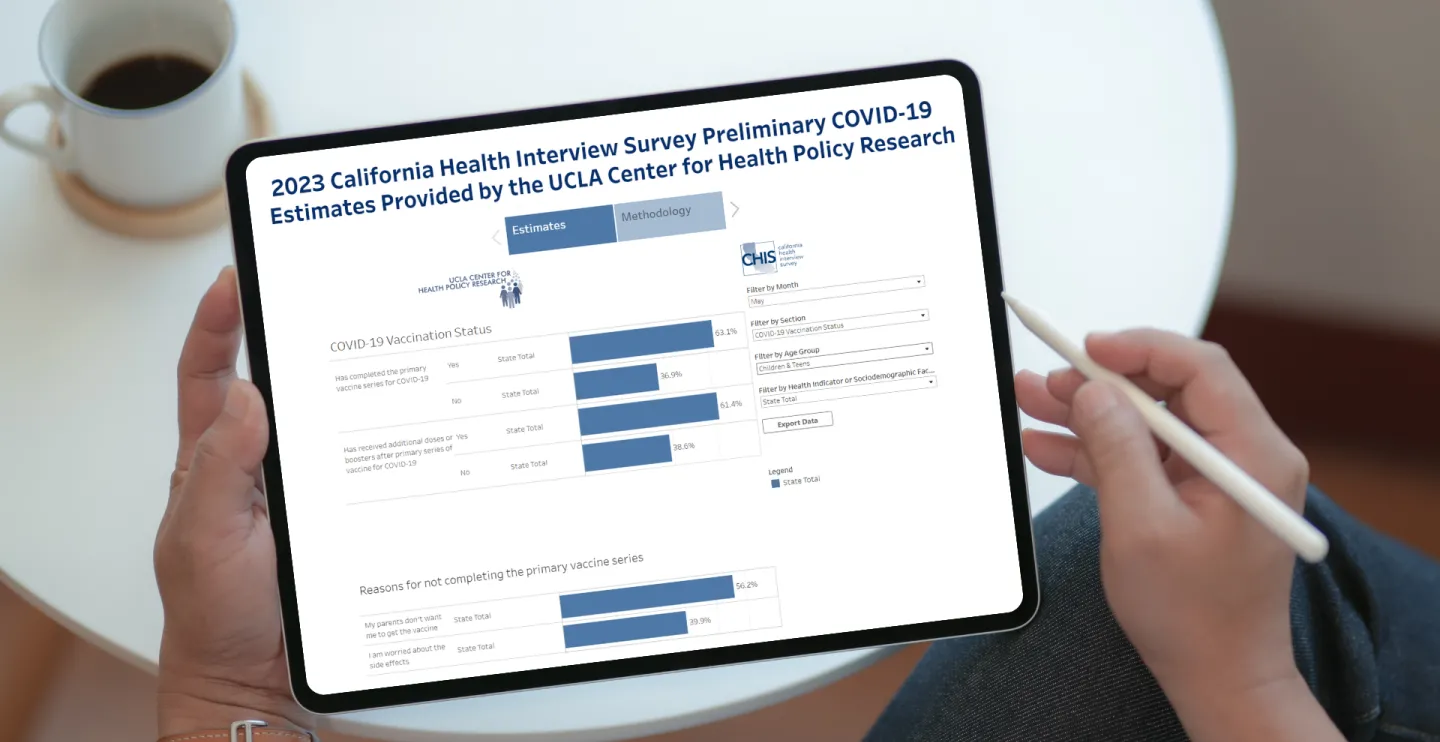More than half — or 55% — of California adults said they have received a positive COVID-19 test result: 46% used only a self-test kit, 27% received their positive result from both a self-test kit and testing site, and 26% from a clinic, hospital, lab or other test, according to May 2023 data released today by the California Health Interview Survey (CHIS).
While self-test kits have made it faster and more convenient to test for COVID-19, the results are not reported to health care providers or local public health departments, making case rates impossible to track.
The data, made available to the public on the 2023 California Health Interview Survey Preliminary COVID-19 Estimates Dashboard, was published today by the UCLA Center for Health Policy Research using surveys collected in May 2023 from 3,660 California adults and 717 teenagers and children. The dashboard features information about access to masks, vaccination status and reasons for not getting vaccinated, COVID-19 testing and more.
Data shows that Californians continue to experience personal and financial impacts. About 11% of California adults experienced financial difficulties with paying rent or mortgage, 2% reported being treated unfairly because of their race or ethnicity, 3% quit their job to care for themselves or a family member due to COVID-19 illness, 2% experienced financial difficulties with paying COVID-19 medical bills, and 2% had difficulty obtaining child care, or experienced an increase in child care experiences.
“Although you may think some of the percentages are small at 2% — when considering the overall California population, we’re talking about more than half a million Californians,” said Todd Hughes, director of the CHIS. “There is nothing insignificant about that. Thousands of Californians are still impacted, years after the initial COVID-19 outbreak.”
The data also highlights some disparities among racial and ethnic groups: 17% of Latinx adults said they had financial difficulties with paying rent or mortgage, three times the 5% of white adults who experienced difficulties.
Other highlights include:
Vaccination Status
- More than 1 in 3 (37%) California teens and children have not completed the primary vaccine series for COVID-19.
- More than half (56%) of teens said the reason they have not completed the primary vaccine series is because their parents don’t want them to get the vaccine.
- Among California adults who have not completed the primary vaccine series for COVID-19, 48% think a vaccine for COVID-19 is unnecessary.
- More than a third (36%) of California adults said they will not get additional COVID-19 vaccine doses if recommended by health guidelines.
Mask Use
- 1 in 8 (12%) California adults said they would not wear a N95, KN95, or KF94 mask even if public health recommended it as a COVID-19 protection.
- 1 in 9 (11%) California adults said they could not get an N95, KN95, or KF94 mask even if public health recommended it as a COVID-19 protection.
- Among California adults who do not have a N95, KN95, or KF94, 43% of California adults said the reason for not being able to get an N95, KN95, or KF94 mask is because they are too expensive.
Earlier this month, CHIS released March and April 2023 COVID-19 data and will be releasing additional data in the coming weeks.
The UCLA Center for Health Policy Research (CHPR) is one of the nation’s leading health policy research centers and the premier source of health policy information for California. UCLA CHPR improves the public’s health through high quality, objective, and evidence-based research and data that informs effective policymaking. UCLA CHPR is the home of the California Health Interview Survey (CHIS) and is part of the UCLA Fielding School of Public Health and affiliated with the UCLA Luskin School of Public Affairs.




